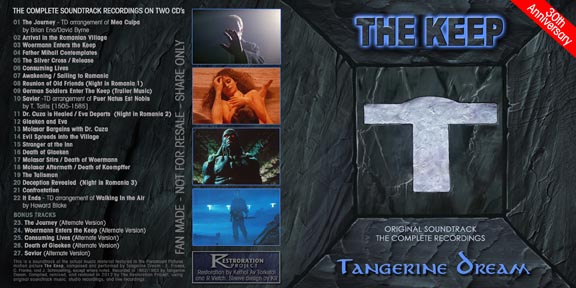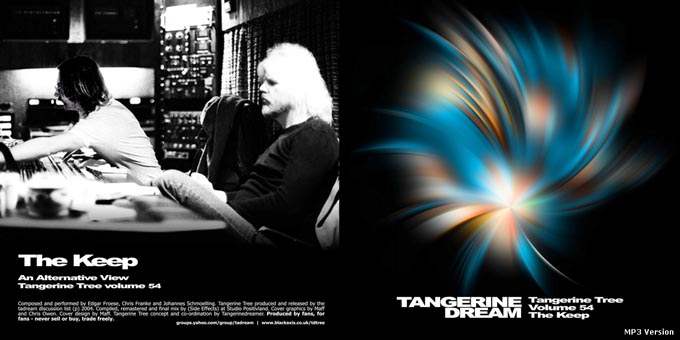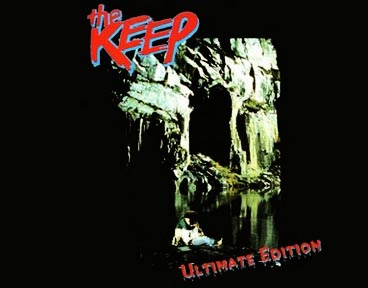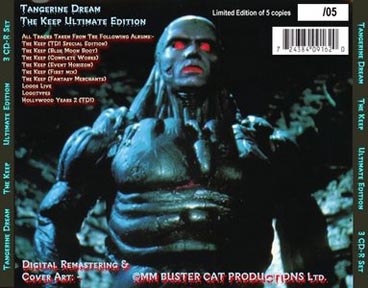The Keep Score by Tangerine Dream
Written by Kit Rae (and friends) in 2005. Last update June 2025. Dedicated to Edgar Froese (1944-2015)
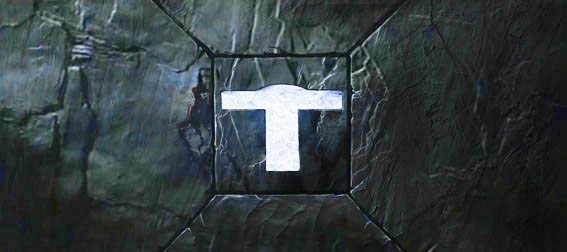
GO DIRECTLY TO THE ARTICLE ABOUT MAKING THE FILM
GO DIRECTLY TO THE HOME VIDEO RELEASE ARTICLE
THE MUSIC OF THE KEEP - The original soundtrack to the 1983 surreal, supernatural horror film The Keep, directed by Michael Mann, was the Holy Grail of unreleased Tangerine Dream film scores. TD is a group of German musical composers, one of the founding pioneers of electronic music since the days of its infancy in the late 1960s. They carved a unique musical category all their own with a series of studio and live concert albums throughout the 1970s, then moved into film soundtrack work in the late 1970s and 1980s, which gave them a much wider fan base worldwide. The Keep is on the dark side of TD's work, composed mostly of brooding and moody atmospheric music and haunting melodies. Much of it is just plain creepy and otherworldly. No official soundtrack of the actual music material used in the film has ever been released. Like the 1982 Blade Runner score by Vangelis, the film music used in The Keep had long eluded fans. Tangerine Dream did release something called an "official soundtrack" in 1997, and Virgin released a slightly different version in 2020, but both releases contained practically none of the music heard in the film.
There are numerous bootlegs that do contain the actual film music, the best being the 2013 Restoration Project version, The Keep Original Soundtrack, the Complete Recordings - 30th Anniversary Edition and the Tangerine Tree bootleg The Keep: An Alternative View.
Here are links to the full score on Youtube if you wish to listen while you read. CD 1 ••••• CD 2 (change the video quality to 720p for best audio quality)
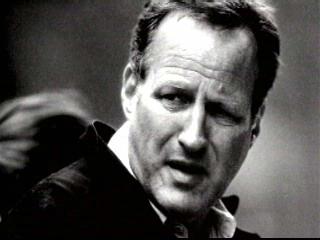

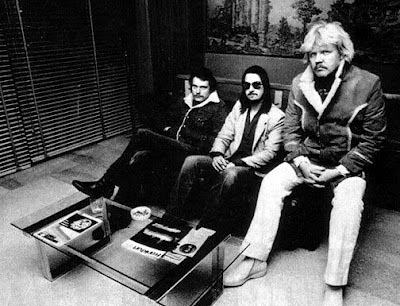
Film director and producer Michael Mann, the 1981 Soundtrack to Thief, and Tangerine Dream members (L to R) Johannes Schmoelling, Chris Franke, and Edgar Froese.
As a kid, seeing Michael Mann's film Thief in 1981 got me interested in the music of Tangerine Dream, leading to my acquisition of the soundtrack album, their fantastic Force Majeure album (just to get the composition used in the film called Thru Metamorphic Rocks) and their earlier soundtrack to William Friedkin's film Sorcerer. After seeing Mann's follow up, The Keep, I was hopelessly hooked on their music, paying exorbitant sums of money to import LPs of all of their studio and live albums. I have since been in a constant search to find all of the music used in this film (this ended in 2013 with the Restoration Project bootleg). Other films they scored in this period were Flashpoint, Firestarter, Wavelength, The Soldier, Risky Business, Legend (the American version of the Ridley Scott film), Heartbreakers, Near Dark, and Miracle Mile. Their music was almost the soundtrack to my childhood. I often listened to it while drawing or painting, reading novels, or reading Heavy Metal, an illustrated magazine of adult science fiction, horror, and fantastic stories that was popular in the 1980s (it was still being published at the time I wrote this). The Keep could have come right out of the pages of Heavy Metal, or its French progenitor, Métal Hurlant. Heavy Metal artist Enki Bilal even helped design the golem-like villain of the film.
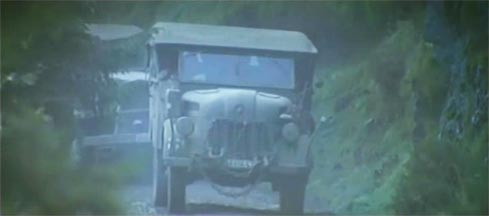
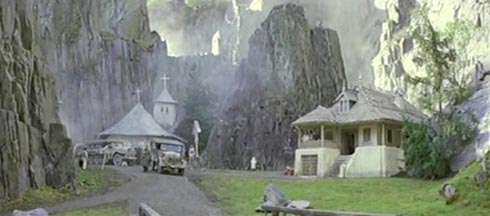
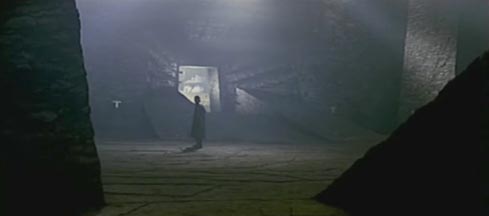
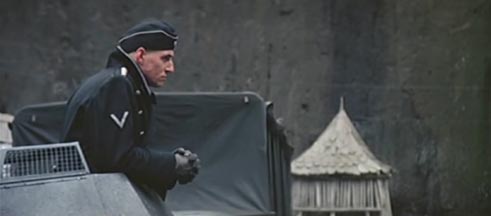
THE MUSIC
It may have seemed like an odd choice to use a German band known for their electronic music to score a WWII period gothic horror film about Nazis awakening an ancient evil in Romania. The same could also be said of the choice to use Tangerine Dream to score Mann's previous Chicago crime drama, 1981's Thief, but it worked brilliantly there just as it did here. After Edgar Froese's death in 2015, Michael Mann wrote down his thoughs about about the experience of working with the band on that soundtrack.
"It was on my first picture, Thief, and Berlin was still a divided city. I had culled music ideas from Tangerine Dream's Alpha Centauri and Phaedra, that I referred to constantly during shooting. In post, after shipping a dupe of the film, many phone conversations and cues back and forth, we spent a week together on the final in their studio. Their studio was amazing. It was a gutted cinema near the Berlin Wall.
Earlier, I had been divided between choosing music regionally native to Thief, Chicago Blues, or going with a completely electronic score. The choice was intimidating because two very different motion picture experiences would result. Right then, the work of Tangerine Dream, Kraftwerk and Faust was an explosion of experimental and rich material from a young generation coming of age out of the ruins and separating itself from WWII Germany. It was the cutting edge of electronic music. And, it had content. It wasn't sonic atmospheres. There was nothing in the UK or the States like it.
Further, there was a relationship between the blues and Froese because he had started out as a blues guitarist. Even though their music was electronic, it had a twelve bar blues structure to most of it. More importantly he, as an artist and a man, was connected to the material reality of life on the street and he found musical inspiration there, as does the Blues. Culturally, he was attuned to the politics of the '60s and '70s. Berlin was still steeped in its recent history and its history… the Wall, shrapnel damage to building facades…was still evident.
The score was adventurous with some real voyages of discovery. Working with analog sequencers and synthesizers we were also processing sound effects, which I had brought in a suitcase on mag, so that ocean waves might crash in G Major, the same key as the cue. It was a wonderful artistic collaboration. Thinking back to what was at the time cutting edge technology but so primitive now, it was more fun. They were innovating processes and re-combining components to do stuff on frontiers that Moog never envisioned, as new ideas showed up.
It was Edgar's open spirit and embrace of possibilities that made it all occur. A somewhat unique soundtrack for its time was the result. Working together with band-mates Johannes Schmoelling and Christopher Franke with Froese in the lead in a gutted movie theater, hard by the Berlin Wall, it seems like not so long ago and it was the best of times."
Mann's positive experience led him to work with the band again for The Keep. Amazingly, the music Tangerine Dream composed for that film, with a few exceptions, does not sound dated today. Many of TDs 1980s soundtracks sound firmly entrenched in the period, but most of the music in The Keep would be perfectly at home in a modern film. The Night in Romania music, Logos music used in the scene where the German soldiers remove the silver cross and awaken the evil, and perhaps the end credits music, each have elements that date them to the early 1980s, but otherwise the rest of the score has held up well.
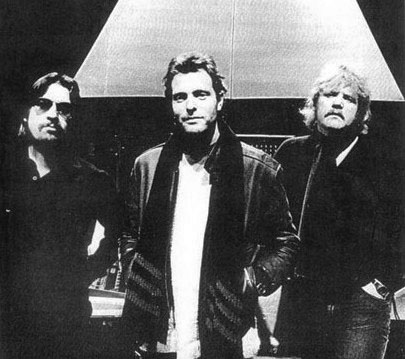
Tangerine Dream members in 1983 (L to R):
Christopher Franke– synthesizers, sequencers, electronic percussion, electronic equipment
Johannes Schmoelling– synthesizers/keyboards, piano, electronic equipment
Edgar Froese– synthesizers/keyboards, guitar, electronic equipment
The Tangerine Dream members at this time were Edgar Froese (1944-2015), Christopher Franke, and Johannes Schmoelling. They had a busy year in 1982 recording the studio album White Eagle in January, touring in support of the album in February-March through Australia, composing the score for the film The Soldier, and recording the Daydream/Moorland music for long running German TV series Tatort (Crime Scene) for the April episode Miriam. According to the Production handbook for The Keep, the filming schedule was such that TD had to start composing music before filming actually began (in September) and before there was a finished script. As films are shot and edited into a rough cut, many directors add a temporary score using existing music until the composers have completed their film score. Mann did that both before and during the filming as a rough cut was being assembled, but took it a step further as he already had in mind to use several existing TD compositions, as well as the music of other composers. This was Mann's standard procedure, as he stated in 1983.
"Music is very important to me; I like to know what my music is going to be before I shoot. I don't like to score afterwards. I have half the music cues in mind before I shoot." - Director Michael Mann in 1983
"... We have a terrific relationship. I think their work on Thief was very successful. This music is very different. This (The Keep) is much more melodic. There are different influences. We're using Thomas Tallis, we're using a lot of choirs processed through a vocoder. I've got in my brain maybe seven or eight hours of their music" - Director Michael Mann in 1983
After initial discussion with Mann about the film score in September 1982, Tangerine Dream then toured Europe in October and November, playing several new compositions. Michael Mann was invited to the last show at the Dominion in London. It was there than Mann heard several new pieces of music that he thought would work in The Keep. TD released some of the music recorded for their London concert on the album Logos Live, just a few weeks after the tour ended, and in December they visited The Keep set at Pinewood Studios. Michael Mann used several sections of the exact music from Logos Live in The Keep.
"We were on tour in November 1982 and planned to play the final concert in London at the Dominion. An at the same time Michael was shooting his movie The Keep, at the Shepperton studios near London. Michael invited us to visit the set so we could get an impression of the dark and mystical atmosphere of The Keep. And in return we invited Michael to our concert. After the show he told us that some of the parts of the music we had performed would go wonderful with his movie. And that was the beginning of our work for The Keep." - Johannes Schmoelling in 2024 from a Vinegar Syndrome Interview
A few of the fan-favorite tracks in the film are actually TD's arrangements of music written by other composers. The opening credit music appears to be a cover of the Brian Eno/David Byrne composition Mea Culpa, although it is not credited as such in the film credits. The other covers were composed by Thomas Tallis - the choral music used when Molasar first appears in smoky-spirit form - and Howard Blake - the closing credits music. The latter two were specifically requested by Michael Mann.
Principal photography for the film was completed the day before Christmas 1982. Some time after that Mann heard a song on the radio from the animated version of the children's book The Snowman, which had recently premiered on UK television. The song from this film was called Walking in the Air by Howard Blake. Mann was so impressed with the music, thinking it embodied a theme of innocence that was the perfect fit for his adult fairy tale, that he immediately asked his music editors to track down the composer. As it turns out one of his music editors, Bob Badami, had worked with Blake previously.
"I can’t remember all the details, but what I have still in my head is the music for the final scene of the movie. The original take is a song from the film The Snowman by Howard Blake (Walking in the Air). It is a children’s cartoon, and Michael had heard this song on the radio in his drive to the Shepperton studios where they were shooting the movie. He was so impressed by this music that he asked us to arrange it for a final scene of The Keep. I found a copy of the song in my archive. Unfortunately, the final scene was recut several times, and each time we had to compose a new arrangement for the song. So, in the final (film) version I know only the chord changes had remained, but this beautiful and nice melody appears only once at the very end." - Johannes Schmoelling in 2024 from a Vinegar Syndrome Interview
Blake was contacted about recording a version of it for Mann's film (or, according to Blake, he was asked to work with TD on a new version). He was busy scoring another film for Paramount at the time, so Mann asked of him permission for TD to create their own synthesizer version to play over the ending of The Keep. Blake granted permission, although reportedly the actual legal permissions to do this that came about later were more complicated.
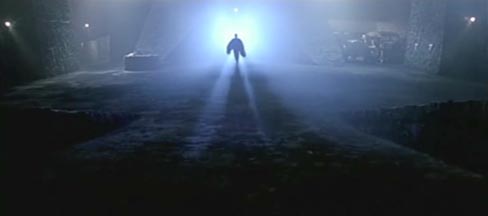
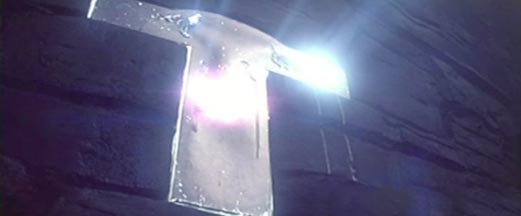
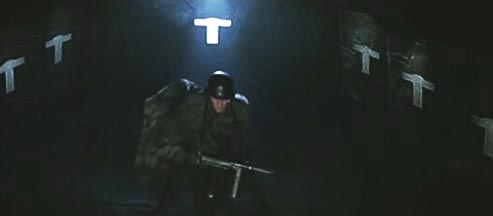
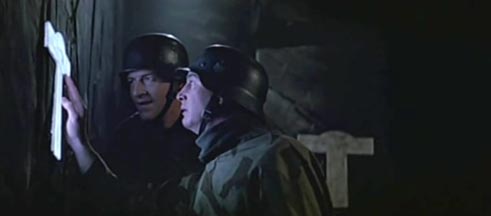
An approximately two hour long rough cut of the film was assembled and the final score composition and recording took place in TD's Berlin studios during the film's post production period in February 1983. Working closely with Mann as they had done on Thief, TD composed and recorded a large amount of music for the film, but it was a difficult process to find music that matched the tone and atmosphere that Mann had imagined for his film. Multiple versions of the Thomas Tallis Puer Natus Est Nobis (Gloria) music were recorded. Actor Scott Glenn's voice was used with a vocoder on several of the tracks. Since the final cut was not yet complete TD also composed several alternate pieces of music for the film. There were mutilple ideas for the ending, and Mann was not sure how he wanted TD to interpret Blake's Walking in the Air music, so several different versions of that were also recorded. A long version that ran over seven minutes was eventually chosen to play over the original ending of the film. Around the time TD finished their work, special effects technician Wally Veevers died in the middle of special and optical effects work on the finale, causing a six month delay in post production. By the time the music was edited into the finished film in late 1983, it had been shortened and a significant portion of what TD had composed was not used.
"The music takes that Michael liked so much from our (Dominion) concert he used and edited to his pictures as he wanted, but I think there were only 2 or 3 tracks. All the other tracks were composed traditionally in our studios in Berlin, by working with VHS cassettes from the scenes of the film." - Johannes Schmoelling in 2024 from a Vinegar Syndrome Interview
TD composed and recorded most of the film score in early 1983, when the film was far from being complete. The final sound mix and music editing of the film soundtrack was delayed until around July-August 1983. TD had finished the film scoring by then, with Edgar moving on to record his solo album Pinnacles in May, and the soundtrack to the film Kamakaze 1989. TD resumed touring in June, composed and recorded the album Hyperboria (recorded in August/released November), and toured in August and November, among other projects that year. They likely were unaware what music they composed for The Keep made it into the finished film - If they even saw the finished film at the time. Read on.
The Keep had no theatrical release at all in West Germany, where the TD members lived and recorded, and was not released on video there until May of 1985. It only had a small release in the US, to mostly negative reviews, and did not earn enough to pay for the production costs. The release in the rest of the world was spread across 1984, with very little promotion. Virgin had all rights to release an official soundtrack, but with the film's delay, a soundtrack release was cancelled. TD member Johannes Schmoelling was not even aware the film actually got a release! In an interview several years after the film was released he was asked why no soundtrack was ever released and stated "As far as I know The Keep was never released in the cinemas, so there was no demand for us to release a soundtrack." He also said TD never even made a mix of their music for an official soundtrack release.
In 1983 Edgar Froese had stated that they were tired and annoyed with the whole film business, which may have also contributed to the lack of a release. Their relationship with Virgin Records was also coming to an end after the release of Hyperboria. I'm sure that and the film's failure and the limited theatrical release also contributed to Virgin not having much interest in releasing the OST.
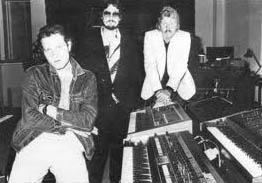
There seems to have been other reasons for the OST not seeing the light of day since then however. According to TD's own website, "An official soundtrack has never been released due to disagreements between the film’s producer and Virgin Records". The exact nature of the 'disagreements' has not been revealed publicly. Ownership rights are complicated and the companies owing them often change hands or merge with other companies every few years. As of 2007 Sony/ATV Music Publishing owned the rights to publish soundtrack music from Viacom's Paramount Pictures subsidiary, including The Keep. As of 2012 BMG Rights Management owned Virgin Music, who owned the phono record rights to The Keep soundtrack, then Virgin merged with EMI to became Virgin EMI Records (later owned by Universal Music) in 2013. Virgin was listed on the 1997 TDI official The Keep soundtrack CD case, and Sony/ATV was listed on The Keep Cues limited edition CD case, which contained soundtrack music and sound effects copied directly from the film.
An OST of The Keep music was eventually released on the 1997 OST CD from TDI, then in a modified form in the 2020 release by Virgin of the OST included in the Pilots Of Purple Twilight: The Virgin Recordings 1980-1983 CD/LP collection. Both releases contain mostly music from that era, but not used in the film. Much of it was music that had nothing to do with The Keep at all. There is the possibility that some of it was intended to be in the the original two hour cut of the film, but got cut when Paramount wanted the film shortened. However, based on comments from Johannes Schmoelling in 2024, that is not the case. Much of that OST music was never intended for The Keep, and some of it may have simply been composed by Edgar Froese long after.
Most of he final film score, and possibly some of the temp score, came from TD's vast catalog of existing work. Mann constantly listened to their music before and during filming. From Tangerine Dream's existing music catalogue, here are the sources used in The Keep:
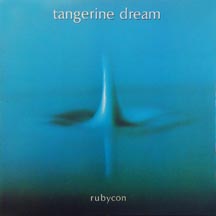
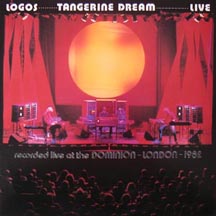
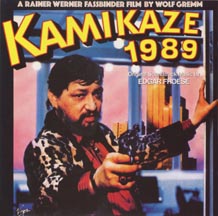
•Rubycon Part II - The intro and choir sections from the 1975 album track were used at several points in the film to show the village being infected by the dark power released from the keep, and in the scene where Cuza makes his bargain with Molasar.
•Logos - The 1982 live Dominion Theatre London concert recordings, including sections of Logos Part 1 (Logos Blue section and Night in Romania section) and Logos Part II (Logos black section). Used for the cross removal and release scenes, and as Molasar's theme music, specifically the "holocaust" scene where Kaempffer walks through the burnt remains of his soldiers and confronts Molasar. 51 minutes of the London concert had already been released on Logos Live in December 1982, but the film also included other music from the full two hour concert that was not on the official release. Although not composed specifically for the film, this music was composed for the tour, just a few months prior to TD officially scoring The Keep.
•Flying Kamikazee - an Edgar Froese composition from his 1982 soundtrack to the film Kamikazee 1989 composed a few months before TD began work on The Keep.
•Mojave Plan - Select brief instrument and percussion sounds are identical to those heard in TD's 1982 studio album White Eagle.
Note that the film versions of this music were remixed and edited differently than the original album tracks by the film music editors Bob Badami and Gordon Greenway. In addition to listening to TD's music, Mann also listened to performance artist Laurie Anderson. Actor Scott Glenn's odd speaking style in the film was also supposedly based on Anderson's spoken word performance style.
There was apparently additional score mixing by Laurie Anderson in late 1983, but I have not found any real confirmation of that. There was also nearly thirty minutes of additional original TD music used in the film and the two film trailers that has never appeared on any official release before or after the film's release. Some of that music did make its way to the public on German radio and a leaked tape of the recording sessions, featured on the First Mix and Blue Moon bootlegs, then later released in a better form on the semi-authorized The Keep: An Alternative View, from the Tangerine Tree fan bootleg series. Various instrument sounds and bits of music heard in the film also appeared in later TD works such as the live Poland concert in 1983 - specifically the tracks Rare Bird (at the 2:06 minute mark) and Poland (at the 22:00 minute mark), and the 1984 Firestarter soundtrack - specifically the track Between Realities, heard when Glaeken activates his staff inside the keep and charges it with the energy of the crosses.
The band members have only briefly talked about composing the music for the film in interviews since it was released. Edgar Froese talked about the film and played a few of the unused film tracks on German radio in 1987 and 1989. Chris Franke discussed film soundtracks and The Keep briefly in a 2006 interview by John Diliberto in Totally Wired magazine. In 2024 Johannes Schmoelling had some very revealing memories about working on the film, as well as his thought about the "official" soundtrack released on TDI. You can hear those in an interview included with the Vinegar Syndrome and imprint 4K releases of The Keep on Blu Ray.
"Each film is different. Some give us all the freedom we want. Some work with us, they play instruments and we work out tunes together (Michael Mann plays guitar on Thief). Sometimes to be different we create more work than is necessary. We want to be different, break certain routines and cliches of film music that are worn out. We try to create counterpoints, do the opposite of what the film is doing or else sometimes you don't even hear the music. In The Keep there was a scene with a very sad feel but we did cool music to it. Or there was very fast action and we did slow motion music". - Chris Franke
MOORLAND
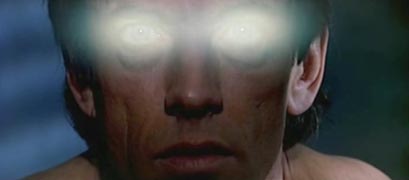
MOORLAND - The film music heard in the bootleg tracks Awakening / Sailing to Romania and Glaeken and Eva was composed and recorded for The Keep in February 1983. It has never been officially released, but a different arrangement called Moorland was composed several weeks after this for a long running German TV series called Tatort (Crime Scene), for the April 1983 episode Miriam. TD also previously had hit single in the 1982 German charts for theme music they composed for the June '82 Tatort episode Das Mädchen auf der Treppe, a remix of the song White Eagle.
Daydream/Moorland was released in 1983 by Virgin records as a 45 single. The Keep film version of Moorland is very different from the Tatort track. For The Keep, just the chord changes being played by the low synth, heard clearly in the first 40 second of the song, are played throughout the sections of the film this was used in. The keyboard melody from the second half of Moorland (starting around 2:10) was played over top of that, but it is a completely different performance. Those synth chords and counter melodies create a very different tone for the track, making it an even more moody and effective piece of music than the Moorland version. Used primarily as Glaeken's theme, it is one of the fan favorite compositions from The Keep. A remixed version of Moorland appears on the 2000 compilation album Antique Dreams, and on the 2007 download release, Antique Dream Land. Some of the same backing music from this track was also used for the track Alley Walkfrom the Wavelength film soundtrack released in 1984.
THE COVER ARRANGEMENTS
OPENING CREDITS MUSIC – This one is an oddity. It sounds like Tangerine Dream doing essentially a cover of the Brian Eno and David Byrne’s song Mea Culpa from their 1981 album My Life in the Bush of Ghosts. Michael Mann was a fan of Brian Eno, and later used Eno's music in his film Heat. Edgar Froese was also friends with Brian Eno. This is most likely a case where Michael Mann liked the Eno/Byrne piece and asked TD to perform it, or something similar, for the soundtrack. What is strange is that neither Eno/Byrne, nor the song is listed in the film credits, whereas Howard Blake's Walking In The Air is given proper credit. Perhaps Eno and Byrne asked not to be listed in the credits, perhaps the film makers could not get permission to use the music, or perhaps no effort was made to get permissions to cover the song and it was hoped that no one would notice the similarity. It is also possible TD came up with nearly the exact same music themselves, as they composed a sequencer pattern with a similar feel in 1982 at the 15:04 mark of Mohave Plan from the White eagle album, but musically it was very different. Considering Eno was an electronic musician well known to both Mann and Froese, and considering the highly praised Eno/Byrne album was released only a year before Mann started work on The Keep, I doubt it was a coincidence. While TD's version does not have the voices and sound effects of the original track, the key and tempo are exactly the same, the sequencer and drum pattern play to exactly the same rhythm and beats, and both have a three note chord progression that changes on exactly the same beat, with the third sustained for two bars.
Mea Culpa (1981 excerpt), by Brian Eno and David Byrne
There has been some debate if this is actually Tangerine Dream performing the music in the opening of the film or Eno and Byrne. The sequencer synth track is a TD style sound, and while the drum pattern mimics the original Mea Culpa pattern, the electronic drum sound is very different, and similar to other Chris Franke drum rhythm sounds from the period. The track also includes the same type of whispered echo voices used on Ricochet Part 1 at the 6:25 mark (from TD's 1975 Ricochet Live album), and Mohave Plan at the 14:50 mark (from TD's 1982 White Eagle album) making it unmistakable that this is TD. There is also the fact that the "music by Tangerine Dream" credit comes on screen just as this music starts. There has been nothing stated publicly about this piece by anyone involved to know what the real story is behind the music.
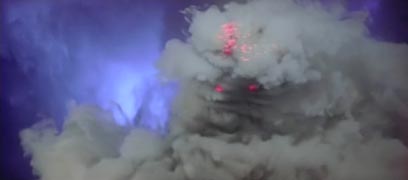
GLORIA - This is Tangerine Dream's arrangement of the Gloria section of Missa Puer Natus Est Nobis (A Boy was Given to Us or Unto Us a Child is Born), a Christmas mass composed in 1554 by Thomas Tallis (often mistakenly credited to William Byrd, as in The Keep Wikipedia entry). This was a track Michael Mann specifically asked TD to perform for the film. Johannes Schmoelling wrote a piano score of the Gloria section of this mass so that TD could arrange the music with their electronic instruments. Edgar Froese referred to this piece simply as Gloria in a radio interview, and it is listed as "Gloria from the Mass for Four Voices" in the film credits, so most bootlegs also call it Gloria. The female singer and the choir used are uncredited. In the film, the same short intro verse section of Gloria was repeated several times. It is enhanced by TD's angelic organ-synth tones, a vocoder choir, and hall reverb-echo. Here is an excerpt of the same section of Gloria performed by a choir.
Gloria (excerpt) performed by choir
The TDI version released in 1997 and 2020 Virgin official soundtrack used the more correct title Puer Natus Est Nobis. That version is very different from the film version, and follows the original Tallis composition more faithfully. TD did not use the Gregorian chant flavor often used when performing this piece, but more of the operatic choir. It is interesting to note that this mass is a Christian song referencing the birth of Jesus, transposed over a scene of the spirit of Molasar, who was more demonic than Christ-like. In this section of the film it is unclear if this spirit is on the side of good or evil, and the juxtaposition of this angelic choral music over his slightly evil, ghostly image was designed to make his purpose ambiguous to the viewer.

The alternate ending to The Keep shown in television broadcasts in the 1990s with the long version of Walking in the Air
END CREDITS MUSIC - This is Tangerine Dream's cover arrangement of Howard Blake's song Walking In The Air from the animated film The Snowman (©1982 Highbridge Music), and one of the fan favorite pieces of music from the film. This is another track Michael Mann specifically asked TD to perform for the film, or according to composer Howard Blake, Michael Mann told him both he and Tangerine Dream thought the song was a 'revelation' and wanted to use the melody throughout the film. I have doubts that Edgar Froese and Tangerine Dream wanted to cover music written by someone else for this film, so this was probably something Mann told Blake to get him on board with allowing the use. Here is what Blake said, from his own website:
In late 1982 I was scoring the American version of 'The Lords of Discipline' in Hollywood and working into the small hours to finish it. One night the phone rang in my suite in the Chateau Marmont. It was director/producer Michael Mann who told me about an extraordinary film he was making called 'The Keep', a strange and ambitious project that somehow combined Nazi occupation in Rumania with monsters and the supernatural. He had decided to have an all-electronic score and was working with 'Tangerine Dream'. They however had just heard 'Walking in the Air' which apparently had been a revelation to them. Michael asked if I could collaborate with them to incorporate my 'Snowman song' into the film. I explained that I was working flat out on a rewrite of 'Lords of Discipline' and would be tied up until the studio recording in January. I had however no objection to Tangerine Dream using the theme and was intrigued as to what they would do with it. They saw my theme as having a very special quality of innocence and transcendence which they felt would contrast with the overwhelming evil of the story and this is indeed how they used it - to some considerable effect. The theme 'Walking in the Air' appears at least four times within the soundtrack, worked in contrapuntally by the 'electronic rock group' Tangerine Dream:
1. The ship voyage
2. After the attempted rape of Dr. Cuza's daughter by Nazi soldiers
3. During the love-scene
4. At the resolution of the film, continuing through the creditsYou will note that according to Blake, in addition to the end music, TD also used his theme in the Awakening/Sailing to Romania and Glaeken and Eva love scenes. This is very odd, because the former is TD's own composition, later released as Moorland, which does not use his chords or melody, and the latter was composed by Thomas Tallis in 1554. It has a similar singing voice, but not even remotely the same music. The only place Blake's music was used in the film is the end scene going into the film credits. TD's version is still very much in their own style and arrangement, but clearly follows the chord progression of Walking In The Air. One of the alternate endings of The Keep, where Eva enters the cave under the keep and revives Glaeken (photos shown below), features a 7 minute + version of this song that is simply beautiful to hear. The Highbridge Music credits (below) for this version of the song indicate it was recorded in February 1983, which is when the final film soundtrack score was recorded.
THE KEEP op.319a (February 1983)
'The Theme from The Snowman' used in the 'Tangerine Dream' soundtrack
Published by: Highbridge Music
This arrangement by: Tangerine Dream
Commissioned by: Michael Mann/Paramount
Instrumentation: Electronic
First Performance: Made in Shepperton Feature film released in USA 1983. Book by E. Paul Wilson, script and direction by by Michael Mann. Starring Ian McKellen, Alberta Watson, Scott Glen. Editors included Bob Badami and Pamela Power.
THE OFFICIAL SOUNDTRACK (OST) - Although Tangerine Dream sent their soundtrack tapes to Virgin Records in late 1983, there was barely anything from the actual film score on it, and the planned 1984 release was ultimately cancelled. There have been several bootleg soundtracks of The Keep circulating throughout the years that have included some of the actual film music, but no official film soundtrack recording of material exclusively from or used in the film has ever been released. However, some of The Keep bootlegs are very good, and do contain unreleased material that seems to come from the original music scoring sessions, and remixed/edited versions of music culled from the VHS or Laser Disk soundtracks. The 2013 Restoration Project release is by far the most complete and best quality version of the soundtrack, running at nearly 2 hours, and includes every major music cue heard in the film, and more. The Keep: An Alternative View from the Tangerine Tree bootleg series is the second best bootleg, although incomplete.
The 1997 TDI version of the official soundtrack and the stand-alone streaming/downloadable version of the soundtrack released in 2020
TD did eventually release their OST of The Keep in a limited run on their own TDI label in 1997, but as with many of their other film "soundtracks," it contained very little of the music actually used in the film. According to the TDI liner notes - this is the only authorized soundtrack of the complete music material originally composed for the movie which was recorded in February 1983. A few tracks were based on those actual master tapes of the film music, but most of this is unrelated music to The Keep. Approximately six minutes of this material did appear in the film, but half of those six minutes of music was reworked and overdubbed by Edgar Froese with new instumentation.
In 2020 Virgin released a modified version of this OST as part of the Pilots Of Purple Twilight: The Virgin Recordings 1980-1983 CD/LP collection. It featured 13 tracks from the 1997 release. As before, this only contains approximately six minutes of from the film, but this time the addtional instrumentation added for the 1997 release was removed.
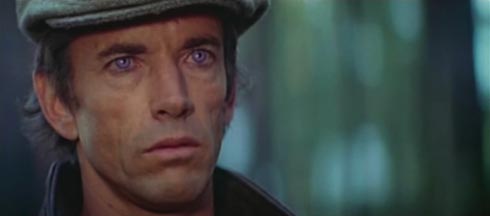
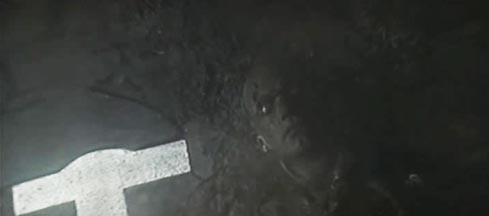
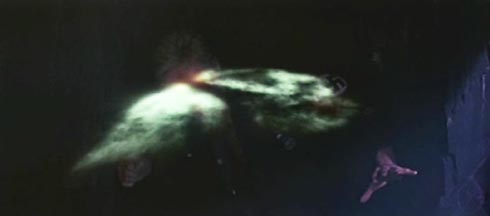
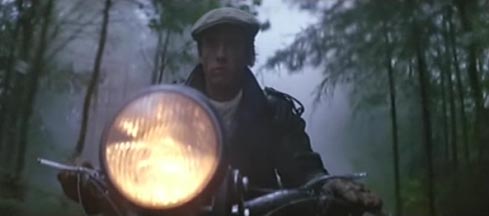
DIFFERENCES IN THE OST RELEASE AND THE ACTUAL FILM SCORE - Edgar Froese played some of the unreleased material from the 1984 The Keep Original Soundtrack in 1987 and 1989 on German public radio broadcasts. I'm sure he was well aware by that time which sections of music from The Keep were fan-favorites, but other than Puer Natus Est Nobis, he did not play any of that actual film music. He only played what was to be on his 1997 TDI release.
TD was well known for re-recording their film music for their OST releases rather than using the music recorded for the films. They often included music created for the film, but not used, or completely new compositions. Part of the reason for doing this was to make the composition's flow better as a collection of music, as well as work within the time constraints of the LP/Cassette Tape/CD formats. This is understandable as the film music sometimes does not work as stand alone music without the visual element, but as was often the case, those re-recorded and remixed tracks were substantially different from the film versions, to the frustration of fans. In cases where material from their live concerts or studio albums was used in films, the resulting soundtracks rarely included that material, and if they did, it was re-recorded in a substantially different form and with different sounding instrumentation (example - the re-recorded version of Thru Metamorphic Rocks on the Thief soundtrack). As is often the case, fan favorite pieces of music from the films sometimes do not appear on these soundtracks at all (example - the beautiful opening cue from the film Legend), or appear in a re-recorded form (example - almost everything on the Thief soundtrack). Sometimes these omissions and alterations are baffling and frustrate fans. Below is Johannes Schmoelling's reasoning behind this practice.
"I would like to say something fundamental about music for films. The music should serve the film, should create a certain atmosphere or emphasize specific characters, or make them recognizable. But if you listen to the music without the pictures, it often seems incomplete or not always musical. That’s why composers rework the music to be released on a soundtrack. And, as an example, I would mention the Tangerine Dream soundtrack to Michael Mann’s movie Thief." - Johannes Schmoelling in 2024 from the Vinegar Syndrome Interview
The 1997 release of The Keep Official Soundtrack took this concept to the extreme, as it only included a few minutes of music from the film, almost none of which were the primary music cues or fan-favorite tracks. I think this OST should be considered more of an unrelated TD studio album, something that fits in with the Logos, White Eagle and Hyperborea albums. While it is very good music, it is simply not the music from the film, and comes nowhere near close to capturing the mood and feel of The Keep. Had this OST actually been released in 1984, it would have probably been one of the most disappointing and frustrating Tangerine Dream soundtrack albums of all time! Suffice it to say, there has never been an official release of the music heard in the film, and likely never will be.
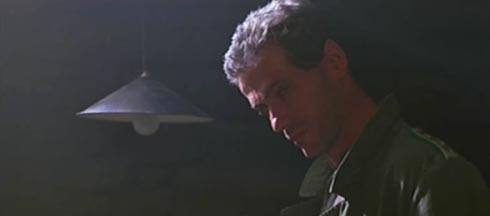

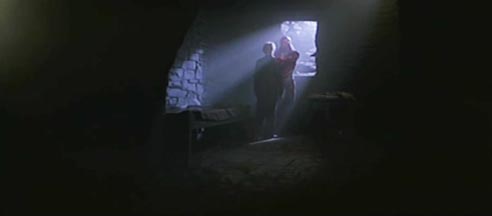
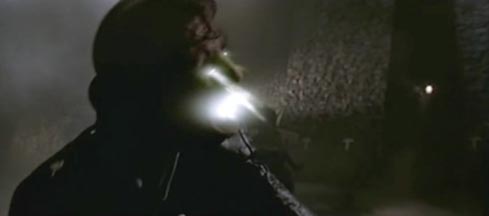
The opening track of the film, an apparent cover of the Byrne/Eno song Mea Culpa, and the closing track Walking in the Air, were not composed by TD. They were not included on the OST possibly because the original composers would have gotten a cut of TD's soundtrack royalty. Securing the rights to use Walking in the Air in the film did turn out to be difficult, so there also may have been soundtrack issues with the company that held the publishing rights through CBS for Walking in the Air. Howard Blake granted permission to use his music in the film, but CBS already had a publishing rights deal with Highbridge Music and Faber Music for the song. Paramount or Virgin would have had to negotiate a royalty deal with them if they intended to use it on a soundtrack released by Virgin, and it would probably been expensive, as the CBS single for The Snowman was a very good seller in 1982. Paramount already expected the over-budget film to perform poorly, hence the practically non existent ad campaign and limited theatrical release for The Keep. It is likely they would not have been interested in spending even more money for soundtrack rights, considering the film bombed and was gone from most theaters only two weeks after release.
"The track Puer Natus East Nobis is a mass for four voices composed by Thomas Tallis, an English composer form the 16th century. And the Gloria is one part of the mass. Michael Mann wanted this music after the rape scene of Eva, the daughter of Dr Cuza. And because this is the first time we see Molasar, the evil ghost, and he rescues Eva by destroying the German soldiers, and brings her back to Dr Cuza. I wrote a piano score so that we could arrange the music with our electronic instruments." - Johannes Schmoelling in 2024 from the Vinegar Syndrome Interview
One of the fan-favorite pieces of film score music was Puer Natus Est Nobis (also known as Gloria), used in the scene where Molasar carries Eva to Cuza. Annoyingly, and typical for TD, the OST track was a re-recorded version of what was heard in the film. While it is a beautiful rendition, it is missing the power and majesty of the actual film music. Edgar played the OST version in the 1987 and 1989 radio broadcasts. The basic music for Night in Romania, Canzone, and the first few minutes of Supernatural Accomplice were used in the film. Ancient Power Plant, Challengers Arrival, and Voices from a Common Land were also played by Edgar on German Radio in 1987 and 1989. Although they are not heard in the film, Edgar stated that those were all tracks originally recorded for The Keep. I have doubs about that, because TD member Johannes Schmoelling said he had never heard them before. I think those are Edgar Froese compositions created much later. Challenger's Arrival is a remixed version of Evil Healing, which appeared on the First Mix bootleg in 1992. It bears little resemblance to the film music, but the synth chords and ascending tones from the middle section (minus drums and guitar) were used in the scene where Cuza makes his bargain with Molasar.
The awakening of Glaeken and love theme music from The Keep was not included on the OST. It had just been re-worked as Moorland for the April episode of the 1983 German TV series Tatort, and was also being released as a 45 single that year, so it is possible that TD thought it over-used at the time, thus its exclusion. The material mostly written for the 1982 live concerts that was used in The Keep, released by TD on the Logos Live album in December 1982, was also not included in the OST.
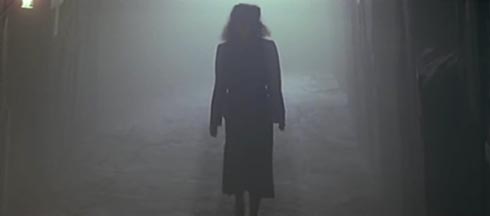
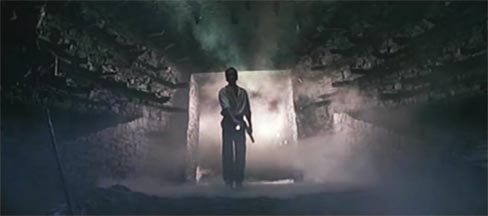
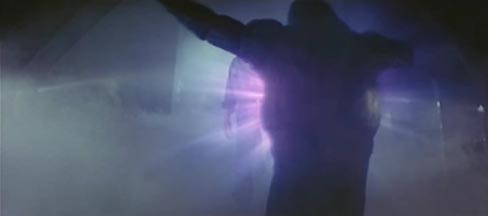
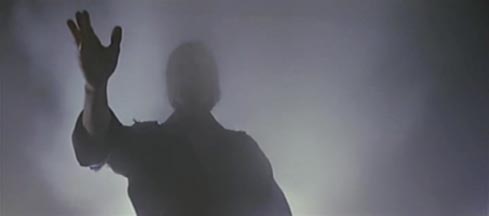
THE MYTHICAL AND LEGENDARY LOST 1984 OFFICIAL SOUNDTRACK - There is the persistent story of a vinyl LP and cassette tape official soundtrack (OST) of the The Keep music that was in stores briefly in 1984, then immediately recalled and pulled from shelves. One internet source claimed that Virgin did make a small production run of the OST, and around 100 copies did get distributed to stores before the licensing issues cropped up causing a recall and cancellation of any future production. Another source states 250 copies, and yet another 300. There are also accounts of unmarked test pressings that have circulated, but I think all of this is simply internet nonsense.
I have memories of seeing an OST album myself in 1984 while on school break. I believe it was in a Sam Goody store (a large music and entertainment retailer in the United States and United Kingdom). I recall that it had the same art on the front as the American movie poster. Other prople have similar memories, so apparently we were all victims of the Mandela Effect or a mass hallucination! In reality, I think what most of us actually "remember" was the Laser Disk version of the film, which was released in December 1984. Laser Disks were new and were easy to confuse with vinyl LP records until you looked close. Both were sold in the same sized printed cardboard sleeves. Music/video stores also sold both LDs and LPs in the same style racks, as intended, but to the novice the LD section could look like a vinyl LP record section.
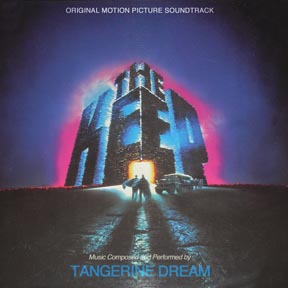
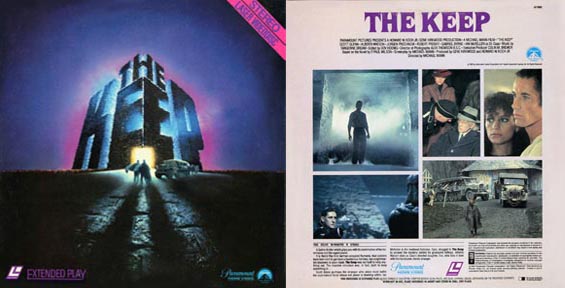
(above left) The supposed album cover art for the original 1984 release of The Keep, sent to me in 2005 by a person who tried to buy this LP record on ebay. It looks similar to the Laser Disk cover art, but this seems to be just another bootleg. (above middle and right) The front and back cover art for the Laser Disk released by Paramount Home Video in December 1984, which I think is what most people mistakenly thought was an official soundtrack album since it was the same size as an LP record sleeve.
The Keep author himself, F. Paul Wilson, also stated on his website in 2004 that he saw a copy of the LP soundtrack in a Sam Goody store (not the same one I thought I saw it in) shortly after the film's release, but did not buy it because he was still pissed off about the film. Wilson's spotting of what he thought was the soundtrack was also probably the Laser Disk. Steven Feldman relates his own account of seeing the soundtrack on his Molasar's Homepage, a website dedicated to finding an original copy of that soundtrack, with information about the film, rare magazine interviews, and information about F. Paul Wilson's Secret History of the World novels, which include The Keep, the first book in his Adversary Cycle.
"I do not have it (the LP release). I saw it in Sam Goody shortly after the release of the film but I didn't buy it -- too pissed." - Author F. Paul Wilson in 2004
I looked for the soundtrack LP every time I went in a music/video store, and I remember on more than one occasion one of my friends pointing to The Keep LD, excitedly thinking the vinyl LP had finally been released. I would then sadly point out that it was just the Laser Disk. I owned an LD player around that time, but I never bought that version of the film. I was waiting for the widescreen version, eventualy released on Laser Disk in 1995. I suppose it is possible that what some of us saw was a vinyl bootleg album, but it seems extremely unlikely that one would have circulated less than a year after the film was released. Also, legitimate retailers, especially large outfits like Sam Goodys, did not sell bootlegs.
It is almost an urban legend among Tangerine Dream fans now, but the fact is, if it existed at least one verifiable copy of this mythical 1984 OST would have surfaced in the past 30+ years. It has not and it will not. Not in this universe anyway. Virgin listed The Keep soundtrack in thier 1984 catalogue for a February release, but both TD and Virgin confirmed it was never actually released. Considering the film tanked in theaters, it makes perfect sense why it was cancelled. Edgar Froese claimed Tangerine Dream did send the soundtrack master tapes to Virgin Records in November 1983, but Johannes Schmoelling says otherwise. He set the record straight in a 2024 interview below (emphasis mine).
"We never, ever reworked the (Keep) music for a soundtrack release. I left the band in Summer 1985, and Christoph left in 1987. That means until we left the band there was no authorized soundtrack of The Keep. NEVER, EVER. We never, ever reworked the music for a soundtrack release. That means there is NO authorized soundtrack of The Keep - I’m referring to this CD here (the 1997 Officially Authorized soundtrack from Edgar Froese/TDI). It is a release on the TDI label around 1998. Ancient Power Plant is track 2, but I must say, I have NEVER heard this song before. The tracks Heritage Survival and Sign in the Dark are pieces of music which we usually played in our concerts, and I think it’s possible that we also played them in our concert at the Dominion in November 1982 in London, but…these music tracks are not part of the film. The track Night in Romania is part of the movie, but during the production of the score, we called that music the Rejuvenation Theme. I found a copy of that score in my archive." - Johannes Schmoelling in 2024 from a Vinegar Syndrome Interview
THE MUSIC BOOTLEGS - WHICH ARE THE BEST? - An official release of any actual soundtrack music from a thirty+ year old movie seems completely improbable at this point, so we are left with the bootlegs. Most people interested in this music have already paid for the official releases that contain pieces of it, but the rest of the music is only available in bootleg form. For the record, I am completely against bootlegging or counterfeiting an official release and selling it for a profit. That is no different than stealing another person's property, but that is not the case here since there has never been an official release of the actual film music, and there appears to be no intention to do so in the future. I have no problem if fans put together and share the music amongst themselves as long as no one is trying to make money from it. With modern file sharing, there is no reason to have to pay a bootlegger selling copies illegally.
If you just want the actual music heard in the film, the 2013 The Keep Original Soundtrack, the Complete Recordings - 30th Anniversary Edition (Restoration Project) is by far the most complete version, includes every music cue heard in the film, and is probably far better and longer than what any official release of the film music would have included. It is on par with the quality of the Blade Runner Esper Edition bootleg and the stellar Blade Runner EMS Recombination bootlegs. I had a hand in cleaning up and mixing that version, as well as doing the cover art. The Keep: An Alternative View (from the semi authorized Tangerine Tree series) is also another good compilation of just the film music, but is incomplete. If you are looking for all of the related music, The Keep Ultimate Edition ( Buster Cat Productions) bootleg is probably the most complete compilation, although very repetitive. It includes some music from the film (not all), alternate versions, and music created for the film but not used. Note that it also includes music from Tangerine Dreams official releases.
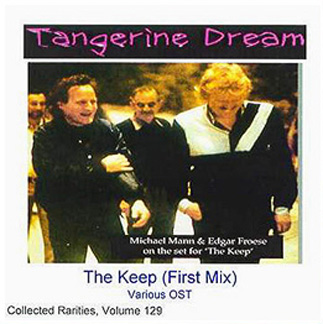
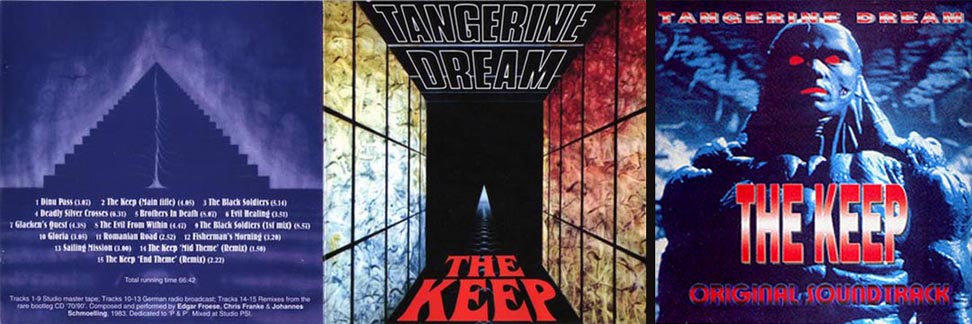
THE KEEP BOOTLEG HISTORY - The first unauthorized soundtrack of Tangerine Dream's music for The Keep that I know of appeared in 1992, the First Mix bootleg. The first one I found was in 1994, and eventually I wound up finding seven or eight different bootlegs (there are over twenty different bootlegs now) of The Keep music, and borrowing or finding the others through online file sharing. Many of the tracks on the various bootlegs were simply repeats of the same tracks from earlier bootlegs, often with confusingly different names and running times. In an effort to sort and compile all the unique tracks onto a few CDs, I started making a list of them in 1999. It was a simple cross reference of which were original tracks, which were simply repeated tracks, which were not from the film at all, and the original sources. After several years, and several more bootlegs, it got to be quite long, if not a bit obsessive, but some may find it useful. I later found two websites doing the exact same thing as I was doing, one with better track comparisons than what I have (links to follow). The pages that follow are my track comparisons and notes of the different bootlegs and official releases to help in finding the best available tracks used in The Keep, and my pick of the absolute best bootleg at the top of the list (the 2013 Restoration Project release).
"I like the TD score--I often listen to it...I do not have it (the LP release)... I listen to a version painstakingly culled / edited from the stereo laserdisk..." - The Keep Author F. Paul Wilson in 2004
It is rumored that some of the early bootlegs were originally sold as LPs, but most were in CD format, all of which are very difficult to find now, but you should never pay for those anyway. All have been seeded on the World Wide Web using BitTorrent file sharing (as of 2013 it appears only the Ultimate Edition and The Keep: An Alternative View are still being seeded). Most of the better ones are available on youtube so that is the best place to find some of this music, although youtube audio is not ideal. The official Tangerine Dream releases that contain a few minutes of this music were also still in production at the time I last updated this page. I strongly urge you to support the band and purchase the official releases that contain some of this music, Rubycon and Logos Live, both of which were still available at the time this article was written.
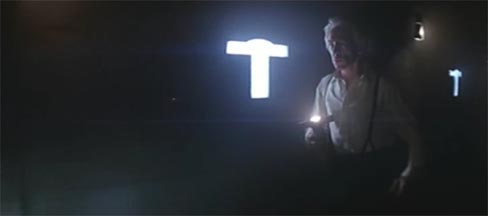
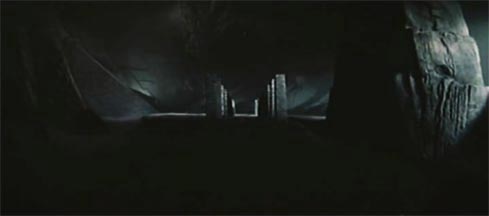
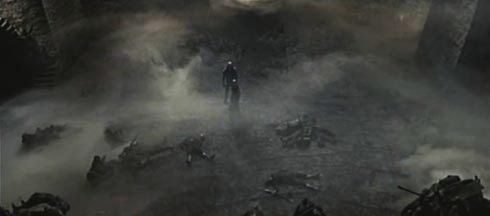
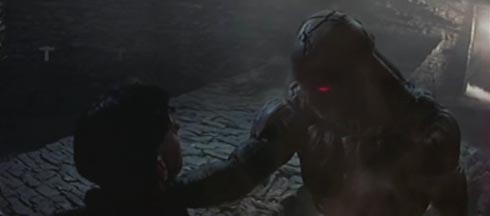
NEVER pay for bootlegs. They should only be shared freely among fans.
THE BOOTLEG LIST
2013 – THE KEEP ORIGINAL SOUNDTRACK - THE COMPLETE RECORDINGS / 30TH ANNIVERSARY EDITION - from Restoration Project (two CD's) bootleg - Youtube of CD 1 ••••• Youtube of CD 2 (change the video quality to 720p - the gear icon in the lower right of the youtube window - for best audio quality)
2010 - THE KEEP CUES - from Ricochet Dream. Semi official release by permission
2004 - TANGERINE TREE VOLUME 54, The Keep: An Alternative View bootleg from the Tangerine Tree project
You can download the individual tracks from this version HERE.
2003 - TANGERINE LEAVES VOLUME 1: London 1982 bootleg from the Tangerine Leaves project
2002 – TANGERINE TREE VOLUME 12: Croydon October 1982 bootleg from the Tangerine Tree project
2001? - THE KEEP LP SOUNDTRACK (CD) from Virgin (not actually from Virgin, it is a bootleg)
2001 - THE KEEP MOTION PICTURE SCORE - from Orange Records (CD) bootleg
2000 – THE KEEP ULTIMATE EDITION - from Buster Cat Productions (three CD’s) bootleg
1999 - THE KEEP - from Event Horizon (double CD)
bootleg
1997 – LOGOSTYPES (CD) - bootleg
1997 - THE KEEP ORIGINAL SOUDTRACK – from TDI/Virgin. Official release (CD) bootleg
1997 - ELECTRONIC ORGY - from Orbiting Soundbits/Telex International (CD) bootleg
1994 – THE COMPLETE WORKS OF THE KEEP Limited Edition (CD) bootleg
1994(?) - THE KEEP – Blue Moon Records (CD) bootleg
1992(?) - THE KEEP (FIRST MIX) - from OST (CD) bootleg
1992 – 70/90 - from Burping Cow Productions bootleg
1990 – 70/90 - from Digital Matrix bootleg
1989 – GERMAN RADIO BROADCAST, February 23, 1989 - bootleg
1987 – GERMAN RADIO BROADCAST, August 28, 1987 - bootleg
1984 –THE KEEP ORIGINAL SOUNDTRACK – from Virgin Records. Official, but the release was cancelled and no worldwide distribution ever occurred.
1982 – LOGOS LIVE - from Virgin. Official release (LP vinyl album, cassette, and CD)
Logos Live can be purchased at Amazon.com
CONTINUE TO PAGE 5 FOR DETAILED OFFICIAL AND BOOTLEG TRACK LISTS
CONTINUE TO PAGE 2 FOR AN ARTICLE ABOUT MAKING THE FILM
Egar Froese (1944-2015)
Rest in peace. You will be missed
LINKS TO OTHER TANGERINE DREAM and THE KEEP RESOURCES
•http://www.tangerinedream.org/ - the official website of Tangerine Dream
•There is a very good summary comparing The Keep bootlegs by Paul Fellows on the French Tangerine Dream website, Dream Gallery
•There is another summary comparing The Keep bootlegs by Steven Feldman on Rainer Rutka's website, here
• Molasar's Home Page by Steven Feldman also has some very good information regarding The Keep soundtrack, the film, and scans of various articles and interviews that have appeared in magazines.
•The Keep IMDB page
•The Keep Wikipedia page - Warning, there are several errors
•Ian McKellen Film page about The Keep.
•Facebook page for an upcoming documentary about the making of The Keep by Stephane Piter, A World War II Fairytale: the Making of Michael Mann's the Keep. EDIT - After many years and broken release dates, this project seems to be indefinitely in an unfinished state.
•La Forteresse Noire - A French website created by Stephane Piter about the making of The Keep. In December 2013 Piter told me his website once had similar content as this website, but he removed all of it in 2012 because the same information will be in his upcoming documentary. I found a 2005 snapshot of his entire website archived on the Wayback Machine website. The content is actually quite different than what I have on this site, includes some English language sections, and is well worth reading. It contains copies of the same old magazine interviews that can be found elsewhere, but also some unique interviews conducted by Piter himself with the cast and crew, as well as dozens of unique photos.
•Also visit Michael Berlings Voices in The Net - The Collectors Tangerine Dream Discography, for a complete listing of all Tangerine Dream releases including the studio albums, live albums, soundtracks, Tangerine Tree, Tangerine Leaves, concert database, and interviews.
•If you are a fan of Tangerine Dream's score for Ridley Scott's American version of his film Legend, there is a page about the different versions of that soundtrack here
The Keep film photos by Graham Attwood, copyright Paramount Pictures. Film screen grabs copyright Paramount Pictures. Other photos copyright the respective copyright holders.
CONTRIBUTORS - I wrote this article with LOTS of help and contributions from friends and fellow TD fans, and fans of The Keep. Thanks go to Jim, Ed, Jerome, Arxemand, Geoff, and Steven. If you would like to contribute any additional info, photos, or know of any other bootlegs or other sources of this music, feel free to email.
SOURCES - tangerinedream.org, The Keep Handbook of Production Information, Fangoria magazine #31 1983, Starburst magazine June 1983, Film Comment magazine December 1983, Fantastic Films magazine March 1984, Fangoria magazine #33 1984, Fangoria magazine #36 1984, l'Ecran Fantastique magazine May 1984, Starfix magazine April 1984, Mad Movies magazine May 1987, Totally Wired magazine April 1986, Tangerine Dream: Remembering the Dream, The Art of Film: John Box and Production Design (Wallflower 2009), The Cinema of Michael Mann: Vice and Vindication (Wallflower 2013), FantaZine #4 1984(?), FantaZine #5 1984(?), Wouter Bessels essay in the Pilots of Purple Twilight book (Virgin 2020), and numerous other MM and TD interviews.
Website and contents ©2005, ©2007, ©2013, and ©2020 Kit Rae. All rights reserved. Linking to this website is allowed, but copying the text content is strictly prohibited without prior authorization. No part of this work may be reproduced, stored in a retrieval system, or transmitted in any other form, or by any means, electronic, mechanical, photocopying, recording, computer networking, or otherwise without prior permission in writing from the copyright holder(s).
Kit’s Secret Guitar, Gear, and Music Page
Guitar stuff, gear stuff, sound clips, videos, Gilmour/Pink Floyd stuff, photos and other goodies.
Copyright Kit Rae.
VISIT MY SWORDS, KNIVES and FANTASY ART WEBSITE www.kitrae.net
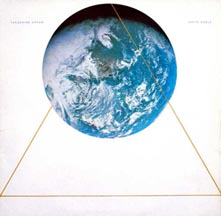

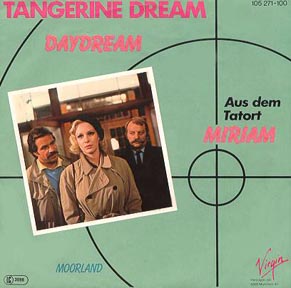
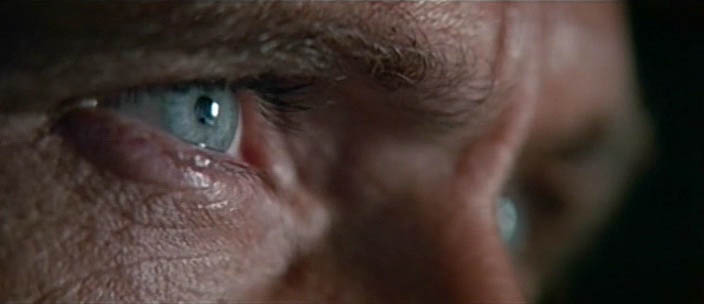
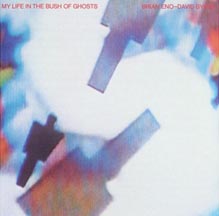

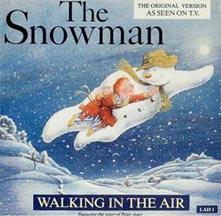
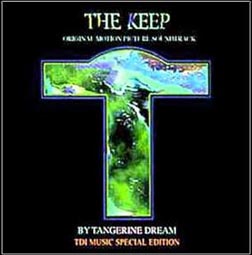
sm.jpg)
